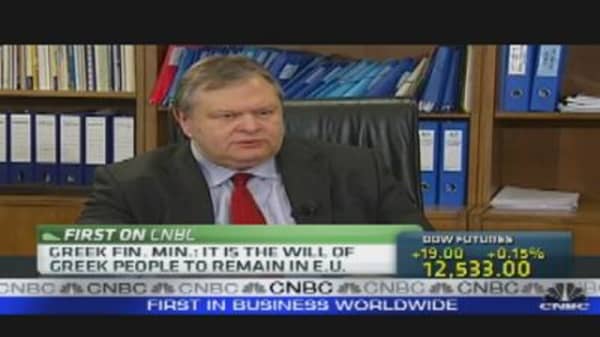Evangelos Venizelos, who was brought in as Finance Minister of Greece just two weeks ago, said Greece's part in the euro zone was "not reversible" in a first on CNBC interview Tuesday.
In his first international broadcast interview since Greece accepted terms for a second bailout by the International Monetary Fund (IMF) and European Central Bank (ECB), Venizelos said that the government was "very happy" with the EU agreement.
He reinforced the importance of euro zone membership to the country and said: "We are a member of the European Union and a member of the euro zone.
"This is definitive and not a reversible situation."
The government last week passed the 28 billion euros ($40 billion) austerity measures necessary to fulfil the terms of its latest bailout, despite protests on the streets of Athens.
Venizelos said that the Greek people backed the government in its continued membership of the euro zone, even though some analysts continue to speculate that the country may be forced to leave the single currency and bring back the drachma.
"This is the common will of our people, not the common will of our political system system and the government and the political majority," he told CNBC.
"I speak now on behalf of our nation. This is our clear position, without any doubt.
Doubts have been cast over whether Greece can complete asset sales and raise its tax take in time to meet the deadlines imposed by the IMF and EU.
"We must present new proofs for our national, political economic credibility and efficiency," Venizelos told CNBC.
"Now it's a new era. The privatisation programme is indeed a very ambitious programme. But we have a solid legal frame, in cooperation with our institutional partners and we have the necessarily willlness, the necessarily know-how to proceed, through a fast track, because we must achieve very concrete financial targets."
The privatization program aims to raise 5 billion euros by the end of 2011 alone and carry out 50 billion euros of asset sales by 2015.
"We need a real European strategy," he said, adding that a "common European sense of need" was essential for Greece.
"We need the necessary technical credibility, because this is the key point for the credibility of my country," he added.
"Without the implementation of the programme, it's not possible to reconstruct, to re-establish the dignity not only the sovereignty, the dignity of our people."
The European Central Bank will accept Greek debt as collateral for loans unless all the major credit rating agencies declare it to be in default, the Financial Times reported Tuesday.
On Monday, Standard & Poor's warned that a plan, backed by both France and Germany, for banks to roll over their holdings of Greek debt into new bonds, would constitute a “selective default”.





